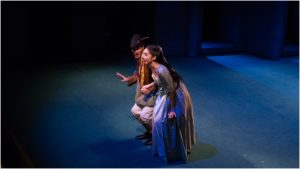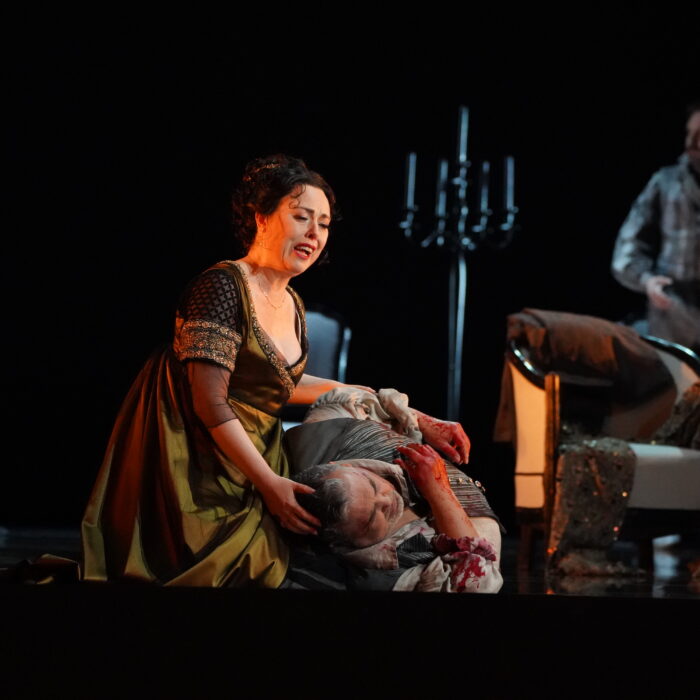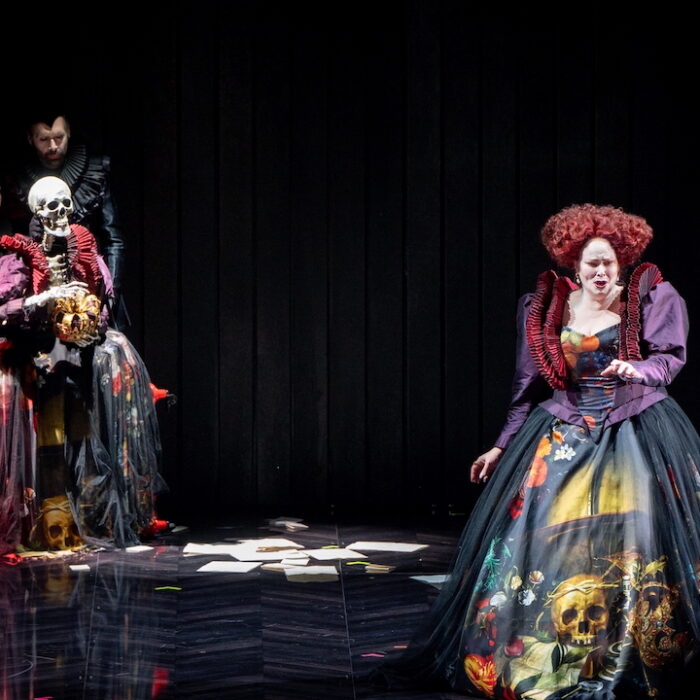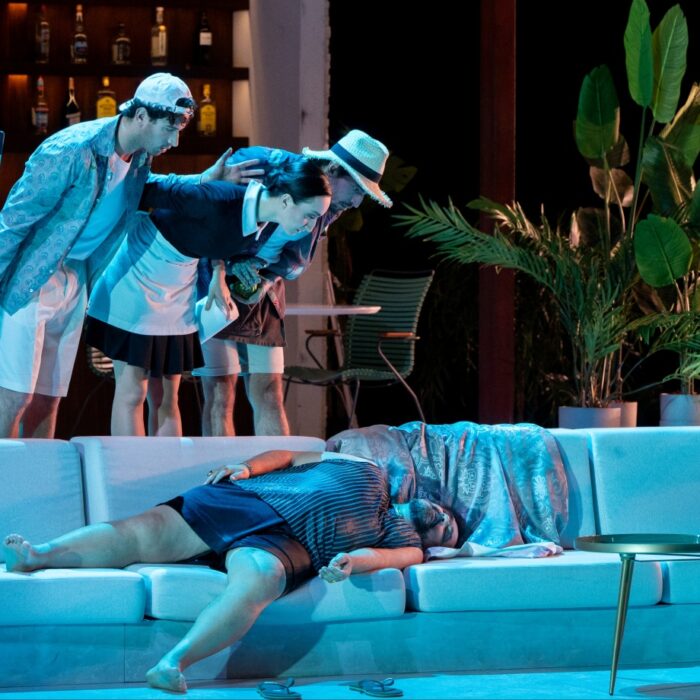
Prague Summer Nights Festival 2018 Review: The Magic Flute
Young Artists Stage an Unexpected Romantic Riot
By Logan MartellThis review is for the performance on July 13, 2018.
At the Prague Summer Nights Festival, a festival featuring young artists, the first few weeks saw a number of splendid concerts, workshops, and competitions all hosted in a city famous for its musical history. As the festival readied to draw to a close, it would do so by staging some of Mozart’s most loved and influential operas, namely “The Magic Flute” and “The Marriage of Figaro,” on the stage of the historic Estates Theatre, which saw the world premiere of Mozart’s “Don Giovanni” in 1787. The cast of “The Magic Flute” on July 13, 2018, seized their chance to shine on this jewel of a stage as they prepare for their professional futures.
All Eyes on the Artists
The set was highly minimalistic, the only piece of furniture being a bed in the middle of the stage. This creative choice, while at first rather vexing, made its full meaning much clearer in time. When the curtain rose on the first act, we are shown Tamino, lying down on the bed and in the midst of a nightmare, and surrounded by several figures of the cast, such as the Three Boys, and the whip-bearing Monostatos. The serpent which threatens Tamino is represented by the Three Boys circling around him with Tamino’s black blanket, before the Three Ladies in service to the Queen of the Night strike it down, scattering the cast of dream characters. While creative risks are almost always appreciated, this major choice made the opening highly ambiguous in regards to Tamino’s location and moral state; the dark forest he originally finds himself in bearing a strong connection to that found in the opening canto of Dante’s “Divine Comedy.” That it opens with a nightmare, as opposed to reality, makes the “rescue” by the Three Ladies a sort of charade, which would tie well into the deception woven by the Queen of the Night. While the bed was used in nearly every scene, in one way or another, its most meaningful moments came when we saw Pamina for the first time, at the mercy of Monostatos, being tied to the bed by his henchmen, thus making Tamino’s nightmare a sort of premonition, and establishing a spiritual connection with Pamina before he is shown her portrait. The second moment came at the closing of the performance where, after Pamina and Tamino are wedded and all trials are overcome, they lay themselves down on their marital bed for blissful repose free of any moors or frightening mothers.
Magic and Mayhem
In the role of Tamino, Carl Rosenthal displayed skillful ornamentation in his first aria, “Dies bildniss ist bezaubernd schon,” but during one of the closing phrases, he seemed to be holding back vocally, the elation of his newfound love being more apparent dramatically rather than vocally. To his credit, Rosenthal’s interactions with the cast and staging played a crucial role in transmuting the simplicity into something more magical, such as the lion, played by two young women with nothing more than a mask, which appeared during the aria “Wie stark ist nicht dein Zauberfloten.” Rosenthal’s dramatic sensibility would also be the vehicle through which Tamino’s final trial was carried, the chambers of fire and water were here represented by figures from the cast arriving as “apparitions” of themselves in order to strike fear into the young couple. This series of silent confrontations were convincingly navigated by Rosenthal and Yvette Keong and served to highlight the rejoicing celebration in store.
As Pamina, Yvette Keong soon delighted after she was initially freed from Monostasos’ advances, showing off her dancing skills, as well as her coloratura, in her duet with Papageno “Bei Mannern, welche Liebe fuhlen.” While Pamina’s character is helpless throughout most, if not all, of the opera, Keong made this helplessness her own, especially with her aria “Ach, ich fuhl’s, es ist verschwunden,” where her phrasing displayed morendos to match her temporarily-broken heart. This despair soon gave way to a joyous quartet with the Three Boys hardly minutes later.
In the role of Papageno, Billy Huyler exuded comedy through his physicality, expression, and timing. His pan-flute during his aria “Der Vogelfanger bin ich ja,” sounded rather breathy and hollow, but this seems deliberate given that he was lamenting his inability to attract a young lover as he would with his birds. While undoubtedly absurd throughout, Huyler’s comedic sensibility prevented the character from being a mere idiot, such as his brief encounter with Monostatos where, in a rush to talk to Pamina, he fails to notice the slaver tying her to the bed until the very moment where they come face to face; in their mutual terror, Monostatos brandishes his whip and Papageno snaps into a martial arts crane stance as they each try to psyche the other out. Another moment in need of mention being when he provides his own dramatic echo upon being separated from Papagena, crying: “Papagena…na…na…” whilst reaching forward. Vocally, Huyler was solid throughout the performance, and while there did not seem to be any particularly shining moments for his singing, his tessitura during his duet with Pamina hinted at a much deeper range that can be explored in other roles.
As the Queen of the Night, the aptly-named Elizabeth Queen, held tremendous presence during her time on stage. Her first aria “O zitt’re nicht, mein lieber schon,” introduced us to the coloratura which Queen would use to nearly bring down the house later, when it came time for the famous aria “Der Holle Rache kocht in meinem Herzen.” While her roulades had the slightest hint of instability on their way up the first two times, Queen utterly excelled at the extended melismas in her upper register, each high note being as sharp as the dagger she forced into Pamina’s hands, and earning thunderous applause with one of the evening’s highlights.
While her time on the stage was brief, due to two of her appearances being condensed into one, Jiyeon Hwang as Papagena was a perfect match for Huyler’s Papageno. Their duet “Pa pa pa,” drew no shortage of laughter as the eager lovers readied to embrace, shaking their rears to imitate an avian mating dance.
Also worthy of mention were the Three Ladies, played by Amanda Osorio, Naomi Merer, and Athena Beebe; their scalar runs were well-synchronized, even as they fought over who would watch over the sleeping Tamino. The Three Boys, played by Charlotte Bagwell, Isabel Celata, and Bergen Price were as entertaining as they were morally ambiguous; tormenting Tamino during his opening nightmare, comforting Pamina during her romantic turmoil, and cutely bopping their heads to the tune of Papageno’s bells before talking him out of his own suicide. Their official meeting with Tamino, “Zum Ziele fuhrt dich diese Bahn,” saw them dispensing grounded advice with a bubbly larghetto, as evidenced by the C major chord formed when the third boy joins the other two with the line “dann, Jungling, wirst mannlich siegen,” or “then, youth, you will conquer like a man.”
The chorus of priests was comprised mostly of young women, many of whom also appeared in the following evening’s “The Marriage of Figaro.” While this presented no real issue vocally due to them singing rather comfortably in the lower reaches of their tessituras, it does clash with the masonic overtones of Schikaneder’s libretto; to the best of my knowledge concerning Freemasonry, women were not allowed until around the 20th century, and in many lodges, this practice continues.
In all, this production made for a sensational showcase of the Summer Nights Festival’s young artists. After seeing what they can do with nothing but a stage and a bed, there’s much to look forward to in the coming years as they further their craft and passion.


